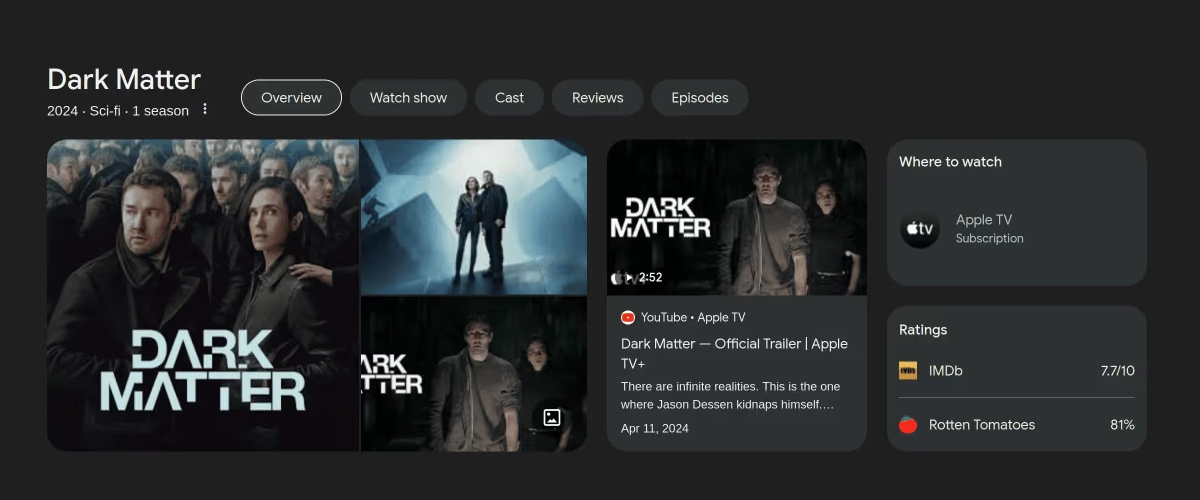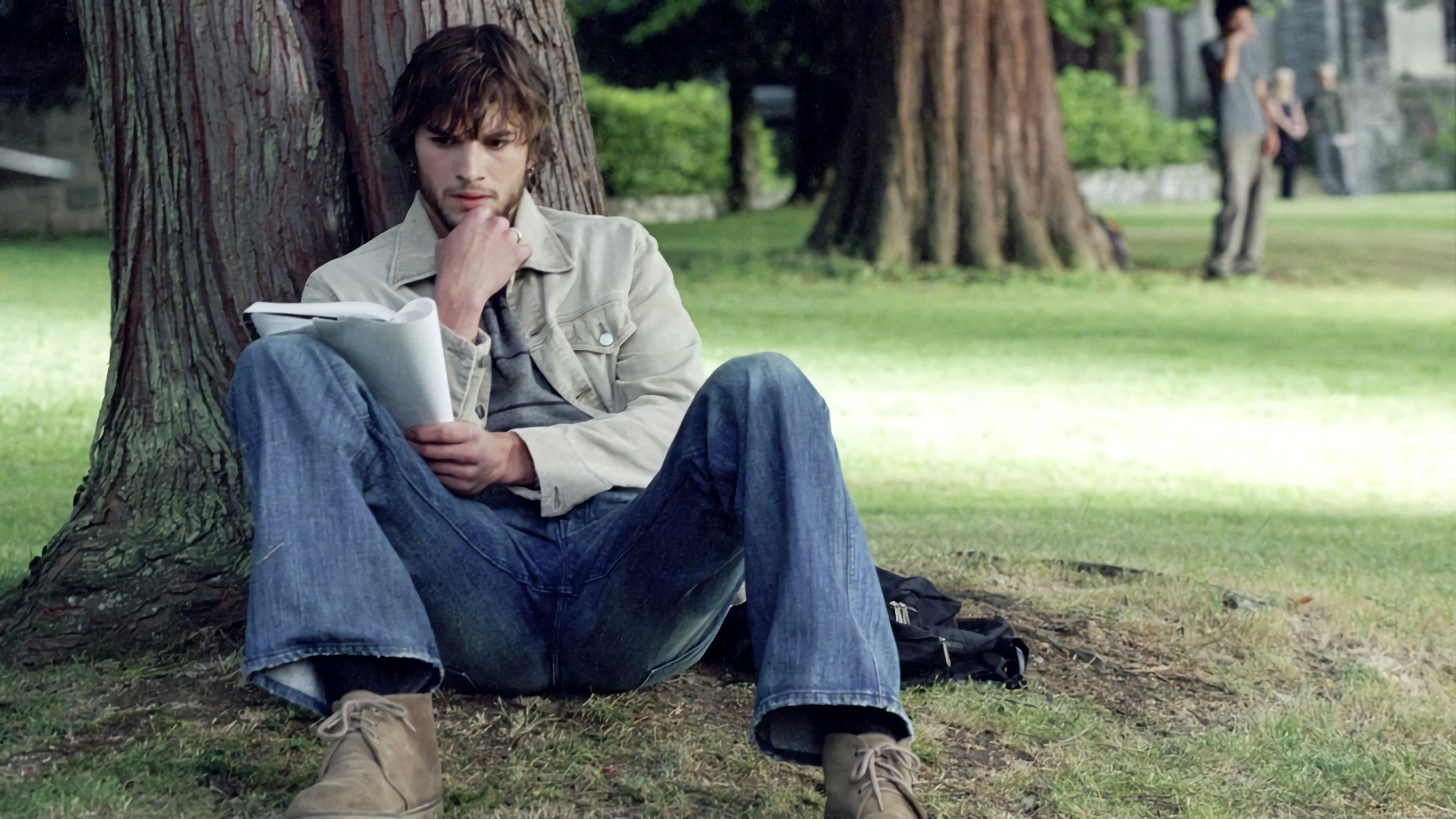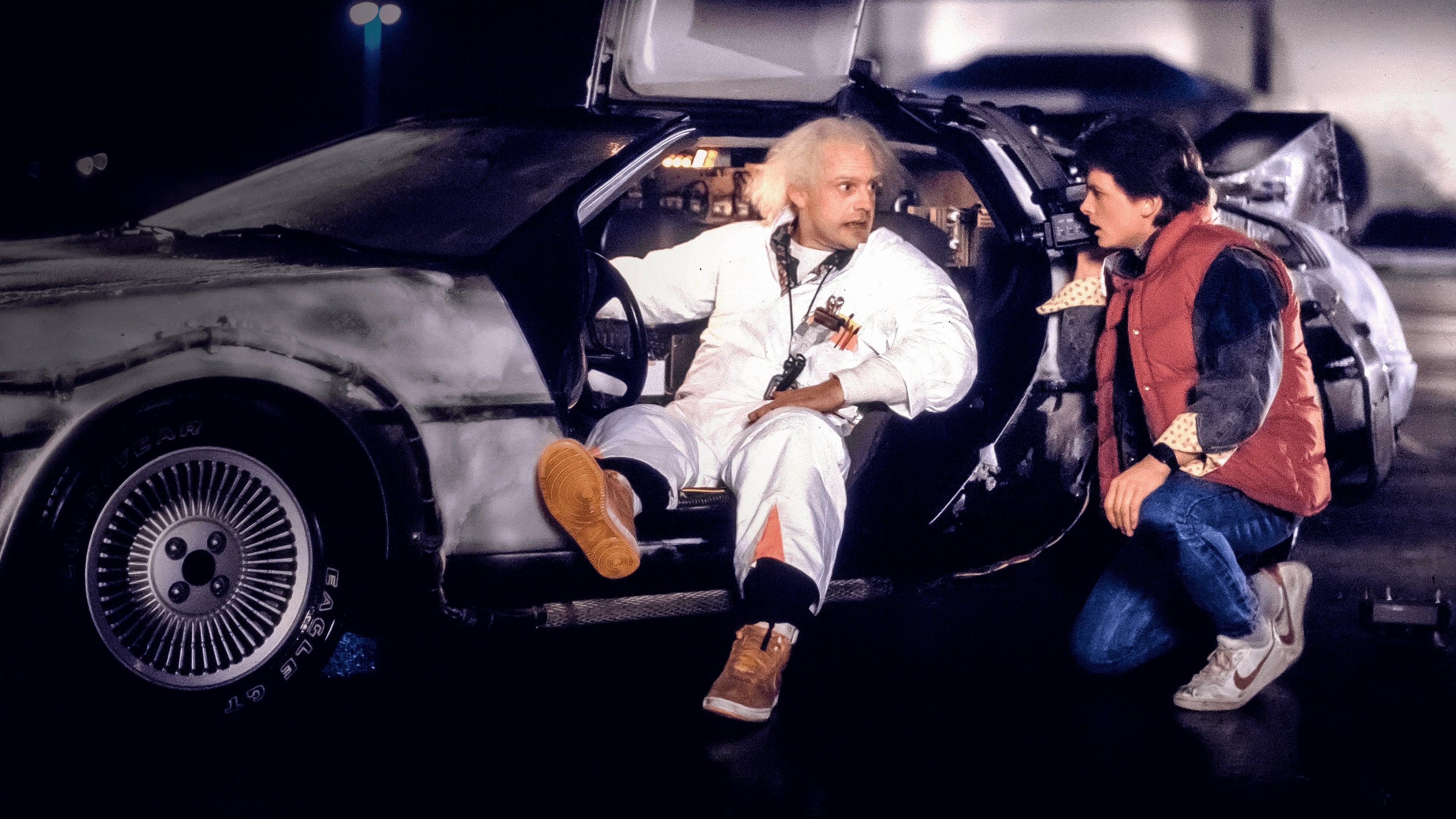Ideas from Dark Matter
The 2024 film and 2016 book are not something special, but I like this idea the author has.
Table of Contents
Typically, I don’t write about movies here, unless they are exceptionally good.
- When they are, I tag them as masterpieces.
- But also there is this tag, cinematography. It’s when I break the rule and actually write about some film, regardless.
There is this TV series from Apple TV, Dark Matter (2024).
This story is about the ideas this work bears. Also, I read the book it’s based upon, and I want to combine both stories into one, and elaborate on this work ideas.

Recommendations #
It was released a bit over half a year ago, and I have it written somewhere that someone — I won’t even recall who! — recommended the thing for me.
This fact alone inspired me to create the whole category of projects, I called them ‘might.’ Right now you can explore might.watch as a reference-implementation. I have the same project for books, might.read (not deployed yet).
Unfortunately, I’m weak for this, some random recommendations. I invented a separate system, to battle this. I try to write down things someone recommends.
Otherwise, it becomes a burden on the outskirts of my mind. It becomes an obsession ‘oh, I have to watch / read / whatever something.’
Most times thing reveals itself as a mediocre piece of junk, yet I may live with it.
I have some movies I’d been postponing watching for many years, and I had no recollection on their origins.
Who recommended me them, in which context. It becomes ‘you must watch it!’ and most times they’re just a burden. They never disappear from my subconsciousness, that’s a bad thing.
Writing things down can help release that and never think of that again. Because, if I really need to remember the thing, I have it written down.
For similar reason, there are two other projects I invented:
- Links is the primer of this, I may never revisit what I posted there.
- and til too, it’s the collection of some fragments from the web, I may return to them, but I may not too.
This habit of writing down all the recommendations is difficult to form, but it’s easy to follow if things are automated.
- I do not write down every single piece someone recommends, only the things I think might interest me.
- Especially if the recommendation comes from some random dude on the internet.
I think that’s how Dark Matter, the TV series, appeared in my plans. Some new colleague of my wife recommended her the series recently, which triggered us to watch it.
We were fortunate to finish the entire show within the weekend, starting with the Friday night. It allowed us to immerse into the universe, and not make it a long project.
While I have no issues with making huge gaps between the sets, still, getting things done feels better, most times.
Plot #
The story is about the scientist who created a thing that enables travelling through multiverse.
In this story, multiverses we’re shown are those where each choice creates another universe, and there are infinite number of them.
He, the scientist, regrets one decision in his life, so he travels through the multiverse to yank his other self from his cozy life and swap places with him.
- The scientist is the antagonist, he’s super-famous and rich.
- The kidnapped guy is the protagonist, and he’s not rich and famous. However, he wants to return to his life.
Family #
I like this family storyline, where they show multiple layers of what family is.
- It’s when you usually more poor than you’re being single, due to having to be present with the family. Instead of overworking.
- I’d say, it’s mostly about change of priorities, if you’re not as dumb as someone who’s life motto is only money-money-money. Those people usually don’t understand that in the first place money are just numbers, after all.
- But not only that, of course. It’s the shared memories, laughs and tragedies, and mutual coping with them.
- It’s talking through the choices you make, getting advices from each other.
- Listening each other, of course. Instead of pushing your and yours only narrative.
- Wearing that fucking ring that I personally absolutely hate since day one. But which I’m used to too much, and uncomfortable with having it not, even despite all the discomfort it brings me.
When we married, I complained my wife about the ring, and joked it also shows everyone I’m lassoed now. ‘It’s the quality mark’ was the reply.
Well, I always loved wearing the fuck-off face before girls, they like the unavailable guys even more. The ring does this job on its own, without the face.
And it helps to understand Frodo too, it’s a genius metaphor Tolkien invented, the ring of power.
I like this moment when he talks to his another-universe girlfriend, talks about the family and there is this ‘you know’ which triggers him to realise people without kids have no ‘know’ in this, they have no expirence of the hardships of parenting. Parenting cannot be observed from the side.
In the book the protaganist is shown as a loser as compared to the non-family guy, while in the movie it’s vice-versa.
- and the author reveals himself as a person with no kids, it’s very visible throught the book. He clearly have no idea of what he writes about, in contrast to the show. The rich-and-famous thing is also quite weak. Author both not rich-and-famous, and does not a family.
This book turned out much worse than the TV show. Which has these themes highlighted better. Yet, I won’t call it a masterpiece. Not even close.
That surprised me. In before times (before, I don’t know, our modern days), I was absolutely sure the book is always better than any movie. Not here. The book is rubbish, the movie is a nice entertainment for one weekend, but no more than that either.
Choices #
The story exploits the uncertainty we all bear throughout our lives. What if?
What if we’d made another choice?
- What would our life be?
- Would it be better?
- Would it be much better?
I guess, they tried to show the whole question is just plain wrong. It would be another life. Not yours, but someone else’s.
Upon arriving at the wrong destination, we know it for certain, that choice was just wrong.
But the correct thing is not to reverse the choice and make a different one. It’s to learn from that mistake, and be more experienced than you was. That other person made no mistake and didn’t learn from it. Yes, their life could be easier, but are we pursuing just an easy life? Aren’t we?
It helps.
It helps to work through some hardships and understand that without them, I’d be just a very different me.
I like the idea of creating a new world each time you make a decision. Oftentimes, when something around me happens — e.g. I’m almost fallen from the bike, or I’m close to a car crash situation, or anything similar — I think ‘huh, I’m so lucky, in a parallel universe I’ve just died here!’

- The same idea was brought by The Butterfly Effect (2004), where the main character tries to change some past, and he changes the future.

But, of course, the primer of all this is Back to the Future (1985) series.
My foster father had the scenario printed from somewhere, and in my childhood, I’ve been reading this story time and again. One of my favourites.
First time I watched the actual movie was probably 5 years ago, maybe slightly more. I know it by heart, I’ve read the scenario tens of times at least. I deeply love the concepts the story tells.
I think you can find it online, I remember me downloading it from somewhere just about 10 years ago, when I couldn’t reach that printed version of my childhood. I should have the file somewhere in my Kindle.
While these two stories deal with the time, past and the future, this story is about parallel universes you can travel through.
Also, I might highlight another TV series we watched after this piece, Dark (2017). It’s about different things, but it highlights the topic of choices too.
Aftereffect #
I think the primary effect after watching and reading this piece is that it provokes some thinking over this constant ‘what if.’
Actually, if we’d give ourselves some space to reflect on many things in life, there’s not much choice in our lives. Especially when we’re aware of ourselves and do not distract from this very moment.
Hence, there’s not much to complain about.